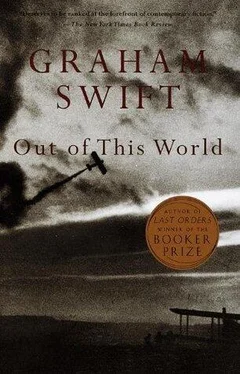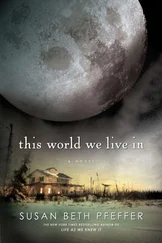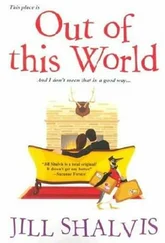Graham Swift - Out of This World
Здесь есть возможность читать онлайн «Graham Swift - Out of This World» весь текст электронной книги совершенно бесплатно (целиком полную версию без сокращений). В некоторых случаях можно слушать аудио, скачать через торрент в формате fb2 и присутствует краткое содержание. Год выпуска: 2012, Издательство: Vintage, Жанр: Современная проза, на английском языке. Описание произведения, (предисловие) а так же отзывы посетителей доступны на портале библиотеки ЛибКат.
- Название:Out of This World
- Автор:
- Издательство:Vintage
- Жанр:
- Год:2012
- ISBN:нет данных
- Рейтинг книги:3 / 5. Голосов: 1
-
Избранное:Добавить в избранное
- Отзывы:
-
Ваша оценка:
- 60
- 1
- 2
- 3
- 4
- 5
Out of This World: краткое содержание, описание и аннотация
Предлагаем к чтению аннотацию, описание, краткое содержание или предисловие (зависит от того, что написал сам автор книги «Out of This World»). Если вы не нашли необходимую информацию о книге — напишите в комментариях, мы постараемся отыскать её.
Out of This World — читать онлайн бесплатно полную книгу (весь текст) целиком
Ниже представлен текст книги, разбитый по страницам. Система сохранения места последней прочитанной страницы, позволяет с удобством читать онлайн бесплатно книгу «Out of This World», без необходимости каждый раз заново искать на чём Вы остановились. Поставьте закладку, и сможете в любой момент перейти на страницу, на которой закончили чтение.
Интервал:
Закладка:
Before there was colour there was black and white. But before there was black and white there was sepia, ochre, tawny, bronze. I was born — just about — in the age of sepia. And it has always seemed to me that before this black-and-white then technicolour century came of age, the world was brown. My father’s world was brown. The brown of leather and horseflesh and mahogany sideboards. The brown of old brown shires and rutted lanes before the spread of tar. Even the first cameras were little brown boxes, glossy and venerable as violins.
My father’s desk was polished oak. And the study was oak panelled, and the spines of Uncle Edward’s books were mostly brown, and even the plaster busts on the mantelpiece — Homer? Cicero? I forget — turning on me their blind eyes that brown afternoon, had acquired a faint, tobaccoey sheen.
The desk was unlocked — for once, negligently unlocked — and when I took from the top left-hand drawer that single sepia photograph, that colour brown, most familiar and companionable of colours, became all at once foreign and strange, the colour of things lost.
She is standing in front of some porch or verandah, in a long dress with a tight waist. And though the photographer was plainly no professional (but I knew that), you must give him his due. She is clutching in one hand a wide-brimmed summer hat which would have cast her face into deep shade were it on her head. The photographer has told her to take off the hat, and she has only just removed it. Her hair is slightly disarranged. She is trying to hold a pose, but it is clear that — because the photographer has not given her time or because of something he has said — it has slipped. Her eyes are wide in happy surprise, her lips are just parted.
Fact or phantom? Truth or mirage? I used to believe — to profess, in my professional days — that a photo is truth positive, fact incarnate and incontrovertible. And yet: explain to me that glimpse into unreality.
How can it be? How can it be that an instant which occurs once and once only, remains permanently visible? How could it be that a woman whom I had never known or seen before — though I had no doubt who she was — could be staring up at me from the brown surface of a piece of paper?
From a time before I existed. From a time before, perhaps, she had even thought of me and when she was undoubtedly ignorant of what I would mean to her.
I was nine years old. It was half-term. November 1927. Through the window — when I dared risk being seen myself — I could see him standing in a corner of the orchard, talking to the gardener (Davis?) who was prodding with a rake a sullenly burning heap of leaves. He is not yet thirty, but he has the bearing of a gruff, grizzled dignitary. He would surely have thrashed me — a fierce, left-handed thrashing — if he had known I had seen that photograph. Just as he would have chastised himself if he had known he had forgotten to lock his desk. As he had never forgotten, not for a single day in nine years, to lock up himself.
I put the photograph carefully back in the drawer, not daring to pry further. There was no way I could ask to look at it again without disclosing I had looked already. No way of knowing if that drawer would ever be left unlocked again.
Why locked away? Till I was fifteen years old and summoned the nerve to ask him, he never told me where she was buried.
The leaves on the trees in the orchard, like the leaves on the bonfire, were brown, and even the thick, reluctant smoke, trailing across a background of brown woodland, had an amber tinge to it. So that that scene, framed in the study window, was almost, itself, like an old, lost photograph. My father, caught unawares, as if I had him squarely in my sights. Talking to the gardener. Stepping back to avoid coils of autumnal smoke.
That Christmas I asked for a camera. Four years later he bought me one.
When I was ten years old, the following autumn, he took me on an aeroplane for a weekend in France. We could have gone by the traditional method, train and boat, but I know now that trains, which always evoke for me mournful journeys to and from boarding school, must have evoked for him even more mournful journeys — out of Waterloo to Southampton, and then again on the French side. Entrainings. Detrainings. Pass and warrant. So, in 1928, apart from reasons of ostentation and novelty, we flew. From Croydon to a military airfield somewhere north of Paris, in a specially chartered Armstrong-Whitworth Argosy, a monstrous, vibrant biplane, with an open cockpit, three engines, fifteen or so other passengers and a cabin interior which would now seem both absurdly plush and prehistoric.
Perhaps that aeroplane trip was only a bribe for my good behaviour in the days that immediately followed. We were there to mark the ten-year-old Armistice, and somehow a public truce had to descend on our own ten-year enmity. I had to play the dutiful and admiring son of my good soldier father. The bribe must have been effective. The Armistice meant nothing to me. And being in a foreign country for the first time was nothing to being several thousand feet up in the air, from where, in fact, one country looked much like another and the demarcations of maps and atlases seemed suddenly a sham.
I wish I could remember more of those three days in France: a turreted, mansarded French hotel; an old French matron, with a distinct moustache, who must have been employed to look after the children of wealthier guests; many men, like my father, wearing dark coats and medals; an occasion in a big square before a cathedral, with bugles and rain; drives to some inexplicable places in the middle of muddy fields (there was much talk about mud — ‘the mud’). And a sense, yes, in spite of myself, that he was pleased with me, and I, in return, was perversely proud of him, that in that strange, ceremonial and rigid atmosphere he was actually unfreezing and making some sort of bid to be like a man I might know. Had I been older I might have thought: Is it possible, is it possible, then? That he means to come out of mourning?
In the evenings a little hotel band would strike up its medley of what must have been mildly jazzed up versions of old trench songs. He watched the dancing like some old buffer tolerating the ways of a frivolous young world.
I don’t even remember the name of the hotel. Or the names of those places we drove to in the rain. My thoughts were on that astonishing aerial journey and the equally astonishing one we would have to make back. And he must have somehow appreciated this. As we waited to board for the return trip, he slipped away momentarily and reappeared with the hint of a gleam in his eye which was not, for once, a piece of public play-acting but a genuine, faltering attempt at fatherliness. I don’t know where this fondness came from, but it seems, as I recall it, that there was something valedictory about it, as if he knew, even then, how the gap between us would only widen further.
A moment later a steward, with a knowing look, ushered us through a doorway, and we followed him across the tarmac to the waiting plane. Standing by its ponderous, uptilted fuselage and dressed in the outlandish costume, goggles and all, which was then de rigueur for airline crew, was no less a person than the pilot. And in no time, while Dad waited below, this same fancy-dress pilot had somehow whisked me up behind the huge, bristling, forward engine and sat me down amidst an array of instruments which would now seem impossibly archaic but which seemed to me then like the very stuff of the future.
I was entranced, Sophie. Entranced.
Perched beside that pilot in that ancient Argosy, I almost forgot my father standing beneath us on the tarmac. It was as if he had pushed me forward into this wondrous outlook on the sky, had made me a present of it, then discreetly withdrawn. I might soar away; he would remain. And though he had staged it all (slipping a coin into the steward’s hand: Yes, of course, no trouble, no trouble at all for Major Beech, v.c), perhaps he was aware, himself, of being only half present. I can see now that throughout that homeward journey his feet must have been, so to speak, still on the ground, still caught in the mud. And I was being lifted up and away, out of his world, out of the age of mud, out of that brown, obscure age, into the age of air.
Читать дальшеИнтервал:
Закладка:
Похожие книги на «Out of This World»
Представляем Вашему вниманию похожие книги на «Out of This World» списком для выбора. Мы отобрали схожую по названию и смыслу литературу в надежде предоставить читателям больше вариантов отыскать новые, интересные, ещё непрочитанные произведения.
Обсуждение, отзывы о книге «Out of This World» и просто собственные мнения читателей. Оставьте ваши комментарии, напишите, что Вы думаете о произведении, его смысле или главных героях. Укажите что конкретно понравилось, а что нет, и почему Вы так считаете.












